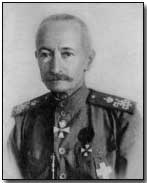Battles - The Battle of Lutsk, 1916
 The Battle of Lutsk of 4-6 June 1916 heralded the launch of the Russian Brusilov
Offensive and started the remarkable run of sweeping successes enjoyed by
Russian Commander Alexei Brusilov until the Offensive later ran out of steam.
The Battle of Lutsk of 4-6 June 1916 heralded the launch of the Russian Brusilov
Offensive and started the remarkable run of sweeping successes enjoyed by
Russian Commander Alexei Brusilov until the Offensive later ran out of steam.
Lutsk had earlier suffered the attentions of the abortive Austro-Hungarian so-called 'Black-Yellow' offensive in 1915. It had subsequently been heavily fortified as a reserve position by the Austro-Hungarians.
The little-respected commander of the Austro-Hungarian Fourth Army, Archduke Josef Ferdinand, was consequently complacent in his firm belief in the impregnability of his line's defences. Furthermore, with an advantage of 200,000 men set against the Russians' 150,000, he was confident in his numerical supremacy.
Thus General Kaledin's success in smashing through the Austro-Hungarian lines on 4 June, and in clearing the hills overlooking Lutsk of its defenders on 5 June proved a shattering wake-up call for Josef.
With the pounding of Russian artillery - creating more than fifty breaches in barbed wire defences - the Lutsk defenders fled in wholesale panic; however extensive use of barbed wire around Austro-Hungarian fortified positions meant that many were unable to escape and consequently taken prisoner by the Russians.
Virtually decimating his army he suffered the loss of 130,000 men in just two days; the scale of the setback consequently broke his career, with Austria-Hungary's dominant ally, Germany, requiring Josef's dismissal.
Nor was Josef's Fourth Army alone; the Austro-Hungarian Seventh Army was similarly deeply affected as the Russian steamroller continued its inexorable advance. The initial success of the Brusilov Offensive almost succeeded in knocking Austria-Hungary from the war.
The Austro-Hungarians lost a staggering 1.5 million men (including 400,000 taken prisoner) and ceded some 25,000 square kilometres of ground during the overall campaign.
Furthermore with the launch of the Brusilov Offensive any hopes the Austrians harboured of bringing about victory in the east were extinguished. Austrian attacks in Italy ceased; and Romania finally entered the war with the Allies.
Photograph courtesy of Photos of the Great War website
A "biff" was a Bristol fighter plane.
- Did you know?
